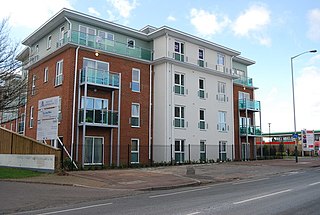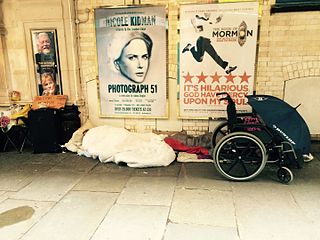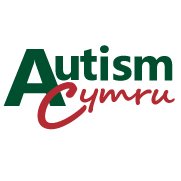
In Ireland and the United Kingdom, housing associations are private, non-profit organisations that provide low-cost "social housing" for people in need of a home. Any budget surplus is used to maintain existing housing and to help finance new homes and it cannot be used for personal benefit of directors or shareholders. Although independent, they are regulated by the state and commonly receive public funding. They are now the United Kingdom's major providers of new housing for rent, while many also run shared ownership schemes to help those who cannot afford to buy a home outright.
This article provides an overview of education in Wales from early childhood to university and adult skills. Largely state-funded and freely accessible at a primary and secondary level, education is compulsory for children in Wales between ages 5-16 years old. It differs to some extent in structure and content to other parts of the United Kingdom, in the later case particularly in relation to the teaching of the Welsh language.

Marie Curie is a registered charitable organisation in the United Kingdom which provides hospice care and support for anyone with an illness they are likely to die from, and those close to them, and campaigns for better support for dying people. It was established in 1948, the same year as the National Health Service (NHS).

The National Lottery Community Fund, legally named the Big Lottery Fund, is a non-departmental public body responsible for distributing funds raised by the National Lottery for "good causes".

A grant is a financial award given by a government entity, foundation, corporation, or other organization to an individual or organization for a specific purpose. Unlike loans, grants do not need to be repaid, making them an attractive source of funding for various activities, such as research, education, public service projects, and business ventures. Examples include student grants, research grants, the Sovereign Grant paid by the UK Treasury to the monarch, and some European Regional Development Fund payments in the European Union.

Lochgelly is a town in Fife, Scotland. It is located between Lochs Ore and Gelly to the north-west and south-east respectively. It is separated from Cowdenbeath by the village of Lumphinnans. According to the 2007 population estimate, the town has a population of 6,834.
Shaw Trust is a charitable organisation in the United Kingdom which supports people with complex needs into good work. It was founded in the village of Shaw in Wiltshire in 1982.
Development trusts are organisations operating in the United Kingdom that are:
Legacy Trust UK was a charitable trust in the United Kingdom, established in 2007 (incorporated 29 November 2006 to support a range of cultural and sporting activities in connection with the 2012 Summer Olympics and 2012 Summer Paralympics in London, with the aim of creating a lasting cultural and sporting legacy from the Games in communities across the UK.

Emergency medical services in the United Kingdom provide emergency care to people with acute illness or injury and are predominantly provided free at the point of use by the four National Health Services (NHS) of England, Scotland, Wales, and Northern Ireland. Emergency care including ambulance and emergency department treatment is only free to UK residents and a charge may be made to those not entitled to free NHS care.

Homelessness in the United Kingdom is measured and responded to in differing ways in England, Scotland, Wales and Northern Ireland, but affects people living in every part of the UK's constituent countries. Most homeless people have at least a modicum of shelter but without any security of tenure. Unsheltered people, "rough sleepers", are a small minority of homeless people.
Groundwork UK is an environmental organisation in the United Kingdom. It is based in Birmingham and is a registered charity under English law.

The Millennium Stadium Charitable Trust is a charitable trust based in Wales, which was established 8 February 2001 and is registered with the Charity Commission. The Trust was established between the Millennium Stadium plc and the Millennium Commission when the Millennium Stadium was built in 1999.
The Welsh Refugee Council is an independent charity to the Refugee Council and Scottish Refugee Council, and works to help sanctuary seekers and refugees in Wales.
UnLtd - The Foundation for Social Entrepreneurs is a charitable organisation in the United Kingdom.
Wales Co-operative Centre is a non-profit co-operative development agency in Wales. It is the largest co-operative development body in the UK, managing several major initiatives in Wales.
UK Community Foundations (UKCF) is a registered charity that leads a movement of community foundations committed to positive social change in the UK through the development of “community philanthropy”. Community philanthropy involves people from all parts of a community working together locally to use the financial and other resources available to them to improve others’ lives.
The Architectural Heritage Fund (AHF) is a registered charity founded in 1976 to promote the conservation and re-use of historic buildings across the United Kingdom. The AHF provides communities with advice, grants and loans to help them find enterprising and sustainable ways to revitalise the old buildings they love, particularly in economically disadvantaged areas. For over 40 years, it has been the leading social investor in creating new futures for historic buildings.

The Canal & River Trust (CRT), branded as Glandŵr Cymru in Wales, holds the guardianship of 2,000 miles of canals and rivers, together with reservoirs and a wide range of heritage buildings and structures, in England and Wales. Launched on 12 July 2012, the Trust took over the responsibilities of the state-owned British Waterways in England and Wales.

Autism Cymru was Wales' national charity for autism with offices in Cardiff, Wrexham, and Aberystwyth. The charity was established in May 2001 through an initial 3-year grant provided by The Shirley Foundation. The founder chair of the Trustees was Dame Stephanie Shirley of the Shirley Foundation.









